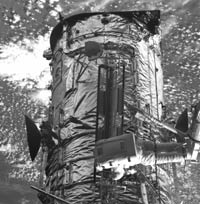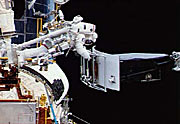Servicing Mission 1
|
In June 1990, a few months after Hubble had been deployed into orbit, scientists discovered a spherical aberration in the space telescope’s primary mirror. Aiming at correcting the optics of its flawed mirror shape and installing new instruments as part of a maintenance plan, the first Servicing Mission (STS-61) to the Hubble Space Telescope was launched in December 1993. Among the seven-member crew was European astronaut Claude Nicollier. The installation of a new device - the COSTAR (Corrective Optics Space Telescope Axial Replacement) - corrected the flatness problem of the mirror’s outer edge (2 microns too flat), which had up until then been responsible for the fuzzy images taken with Hubble. This abnormality resulted in light from observed objects being scattered, forming a fuzzy halo. COSTAR consisted of five pairs of corrective mirrors that were placed in front of the Faint Object Camera, the Faint Object Spectrograph, and the Goddard High Resolution Spectrograph. This new tool successfully remedied Hubble’s blurry vision. Another major renewal was the replacement of the Wide Field Planetary Camera (WFPC) with the newer Wide Field Planetary Camera 2 (WFPC2). This significantly improved Hubble’s ultraviolet performance due to WFPC2 incorporating advanced detectors and a built-in corrective optics system. Additionally, astronauts installed and replaced other instruments:
Links |
Astronauts are replacing the ESA built solar arrays during the First Servicing Mission. The 280 kg Wide Field Planetary Camera is easily lifted by astronauts in the weightless environment of space. |

